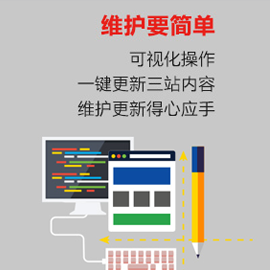C++中怎么實現(xiàn)一個循環(huán)隊列-創(chuàng)新互聯(lián)
本篇文章給大家分享的是有關(guān)C++中怎么實現(xiàn)一個循環(huán)隊列,小編覺得挺實用的,因此分享給大家學習,希望大家閱讀完這篇文章后可以有所收獲,話不多說,跟著小編一起來看看吧。

具體內(nèi)容如下
circularQueue.h
#pragma once#pragma once#ifndef CIRCULARQUEUE_H#define CIRCULARQUEUE_H #include<iostream>#include<ostream>using std::cout;using std::cin;using std::endl;using std::ostream;template<class T> class cirQueue; template<typename T>class cirQueue{public: cirQueue(int sz); ~cirQueue(); void push(const T& elem);//進隊 void pop(T& elem);//出隊 bool empty();//查看隊列是否為空 int getSize();//返回隊列中元素的個數(shù) void clearQueue();//清空隊列中的元素 void print();//打印隊列中的元素 int getfront() { return front; } int getrear() { return rear; } bool getTop(T& elem);//讀取隊列首個元素 template<typename T> friend ostream& operator<<(ostream& os, cirQueue<T>& queue); private: bool _full()const;//判斷隊列是否已滿 int maxsize;//隊列較大的空間 T* element;//存放于隊列中的元素數(shù)組 int front;//模擬隊頭指針 int rear;//模擬隊尾指針}; template<typename T>cirQueue<T>::cirQueue(int sz) { maxsize = sz; element = new T[maxsize]; if (element == nullptr) cout << "內(nèi)存分配失敗" << endl; front = 0; rear = 0;} template<typename T>cirQueue<T>::~cirQueue() { if (element != nullptr) delete element;} //進隊template<typename T>void cirQueue<T>::push(const T& elem) {//需要保證隊尾指針位置與首個元素相差一個位置 if (rear > (maxsize - 1)) rear -= maxsize ; if (front > (maxsize - 1)) front -= maxsize ; if (!_full()) {//隊列未滿的情況 element[rear++] = elem;//隊尾向后移動一位 //++rear; } else { cout << "隊列已滿,不能插入!" << endl; return; }} //出隊template<typename T>void cirQueue<T>::pop(T& elem) { if (rear > (maxsize - 1)) rear -= (maxsize - 1); if (front > (maxsize - 1)) front -= (maxsize - 1); if (!empty()) {//隊列未空的情況 elem = element[front++];//隊頭向后移動一位 element[front - 1] = 0;//置零 } else { cout << "隊列已空!" << endl; return; }} //查看隊列是否為空template<typename T>bool cirQueue<T>::empty() { if (front == rear)//待定 return true; return false;} //返回隊列中元素的個數(shù)template<typename T>int cirQueue<T>::getSize() { int num = 0; if (front <= rear) return rear - front; else return maxsize - front + rear + 1;} //清空隊列中的元素template<typename T>void cirQueue<T>::clearQueue() { if (!empty()) { int Index = 0; while (front < rear) {//front逼近rear element[front++] = 0; if (front == rear) return; } if (rear < front) { while (front <= maxsize - 1)//刪除front至數(shù)組尾端的數(shù)據(jù) element[front++] = 0; front -= maxsize; while (front < rear) {//刪除front至rear的數(shù)據(jù) element[front++] = 0; if (front == rear) return; } } }} //打印隊列中的元素template<typename T>void cirQueue<T>::print() {//與clearQueue函數(shù)原理一致,將front替換為Index if (!empty()) { int Index = front; while (Index < rear) { cout << element[Index++] << " "; if (Index == rear) { cout << endl; return; } } if (rear < Index) { while (Index <= maxsize - 1) cout << element[Index++] << " "; Index -= maxsize; while (Index < rear) { cout << element[Index++] << " "; if (Index == rear) { cout << endl; return; } } } }} //讀取隊列首個元素template<typename T>bool cirQueue<T>::getTop(T& elem) { if (!empty()) { elem = element[front]; return true; } return false;} template<typename T>ostream& operator<<(ostream& os, cirQueue<T>& queue) { os << "隊列中的元素數(shù)量為:" << queue.getSize() << endl; return os;} //判斷隊列是否已滿template<typename T>bool cirQueue<T>::_full()const { if (front - rear == 1 || front - rear == -maxsize + 1) return true; return false;} #endif // !CIRCULARQUEUE_H
main.cpp
#include"CircularQueue.h" int main(){ cirQueue<int> cq(20); int a = 0; for (int i = 0; i < 19; i++) { cq.push(i); } cq.print(); cout << cq; for (int i = 0; i < 20; i++) { cq.pop(a); } cout << cq;//此時front=rear=19 cout << cq.getfront() << " " << cq.getrear() << endl; //for (int i = 19; i < 25; i++) //{ // cq.push(i); //} cq.push(19); cq.print(); cout << cq.getfront() << " " << cq.getrear() << endl; cout << endl << endl; cq.push(20); cq.getTop(a); cout << a << endl; cq.print(); cout << cq.getfront() << " " << cq.getrear() << endl; return 1;}
以上就是C++中怎么實現(xiàn)一個循環(huán)隊列,小編相信有部分知識點可能是我們?nèi)粘9ぷ鲿姷交蛴玫降摹OM隳芡ㄟ^這篇文章學到更多知識。更多詳情敬請關(guān)注創(chuàng)新互聯(lián)行業(yè)資訊頻道。
文章名稱:C++中怎么實現(xiàn)一個循環(huán)隊列-創(chuàng)新互聯(lián)
網(wǎng)頁地址:http://chinadenli.net/article4/cohoie.html
成都網(wǎng)站建設(shè)公司_創(chuàng)新互聯(lián),為您提供企業(yè)網(wǎng)站制作、外貿(mào)網(wǎng)站建設(shè)、軟件開發(fā)、用戶體驗、建站公司、服務器托管
聲明:本網(wǎng)站發(fā)布的內(nèi)容(圖片、視頻和文字)以用戶投稿、用戶轉(zhuǎn)載內(nèi)容為主,如果涉及侵權(quán)請盡快告知,我們將會在第一時間刪除。文章觀點不代表本網(wǎng)站立場,如需處理請聯(lián)系客服。電話:028-86922220;郵箱:631063699@qq.com。內(nèi)容未經(jīng)允許不得轉(zhuǎn)載,或轉(zhuǎn)載時需注明來源: 創(chuàng)新互聯(lián)
猜你還喜歡下面的內(nèi)容
- seci-log1.05發(fā)布,日志分析增加業(yè)務系統(tǒng)日志-創(chuàng)新互聯(lián)
- 利用php怎么編寫一個驗證碼小程序-創(chuàng)新互聯(lián)
- 部署mysql5.5+版本與mysql5.5之前版本主從有哪些差異-創(chuàng)新互聯(lián)
- vue中怎么動態(tài)修改a標簽的樣式-創(chuàng)新互聯(lián)
- PHP如何實現(xiàn)等比壓縮圖片大小-創(chuàng)新互聯(lián)
- 計算機的核心部分有哪些-創(chuàng)新互聯(lián)
- win10中cad卸載不干凈無法重裝的解決方法-創(chuàng)新互聯(lián)

- SEO站長如何提升網(wǎng)站的關(guān)鍵詞排名和權(quán)重值? 2023-04-17
- 如何養(yǎng)成富站長的秘笈 2021-10-11
- 網(wǎng)絡(luò)公司如何選擇,選擇大的還是小一些的? 2023-10-29
- 小型企業(yè)適合建設(shè)什么樣的網(wǎng)站 2016-10-10
- 互聯(lián)網(wǎng)時代農(nóng)民的新生活 2022-11-14
- 外貿(mào)推廣為什么不可忽視移動端 2023-05-31
- 網(wǎng)站SEO排名軟件 2021-11-23
- 網(wǎng)站建設(shè)制作一個網(wǎng)站有哪些步驟?詳細介紹企業(yè)網(wǎng)站制作流程大型交友網(wǎng)站建設(shè)創(chuàng)新互聯(lián) 2023-11-25
- 怎么讓網(wǎng)站快速收錄? 2022-12-04
- 創(chuàng)新互聯(lián)域名服務包含內(nèi)容有哪些? 2023-01-07
- 網(wǎng)站,SEO優(yōu)化等等這些要怎么做呢 2016-10-27
- 網(wǎng)絡(luò)推廣中怎樣開展網(wǎng)址標記 2014-07-30